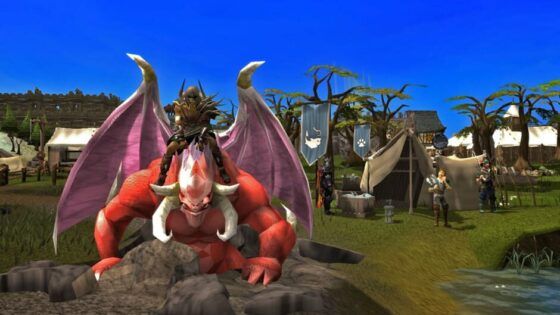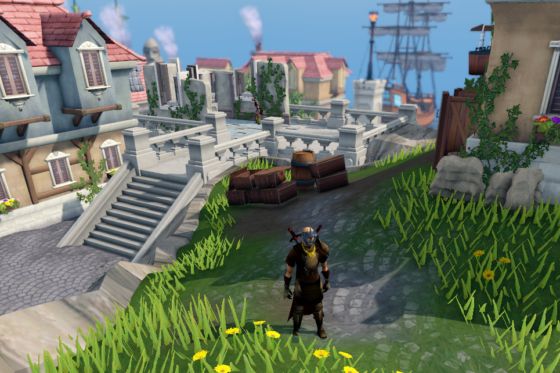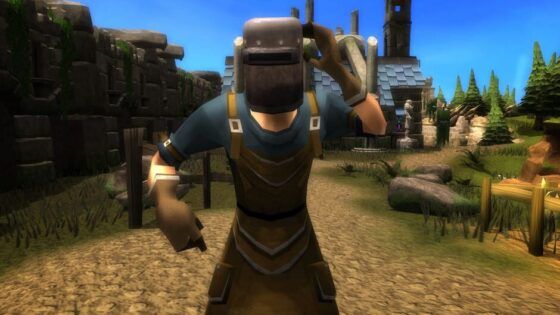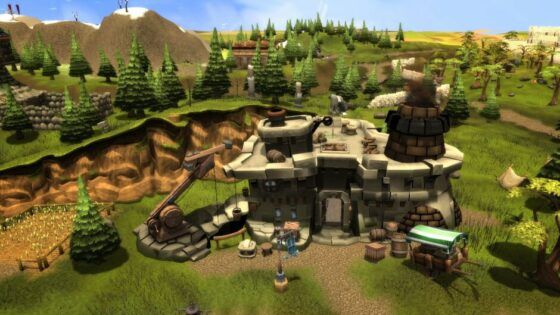2001 may have held the prospect of a space odyssey, but instead it delivered RuneScape. In the intervening years, publishers have risen and fallen, consoles have progressed through four generations, and EA has launched at least 20 iterations of the same football game.
RuneScape has had a consistent and loyal fan-base with peaks broken in 2019 and again in 2020. With 20 years of development under its belt, we thought it was worth seeing how the old boy’s doing. I hadn’t participated much in this cultural phenomenon at any point in those two decades, and went in with the wary excitement of a dog encountering a lemon for the first time.
I expected RuneScape to look bad, so imagine my surprise to find a polished UI and appealing artwork. While this in itself doesn’t speak to the quality of a game, it happens to be a foreshadowing of much of my engagement with RuneScape – low expectations going in, followed by somewhat regular surprises at the level of quality.

Diving into character creation; some low expectations were admittedly met at this point. The character models don’t seem to have changed much over the years, though this is likely part of the game’s charm for some people. I can’t say that it really bothered me, and there was still a sufficient level of customization for me to create a balding, scholarly wizard type. The choice of faces was very limited, but that doesn’t matter when the choice is between 3 similar looking sets of polygons.
Unsurprisingly, in a game 20-years-old, I struggled to find a name that wasn’t taken. I tried some real names backwards, resulting in the birth of mighty Leojyllib. I considered going back to remodel my character accordingly, but Leojyllib – I want you just the way you are.
Dropped into tutorial island, I was immediately able to recall the experience of having played the game many years earlier. There is a slight lag between the player’s click and the resulting action, apparently an unavoidable part of RuneScape’s coding. I’ve often felt that clicking around games, rather than using WASD or arrow keys, can make them feel more like the menu of a game. This realization, particularly with the input delay, allowed me to make an early conclusion that this game is best enjoyed as a casual experience.

Runescape, Jagex - Screenshot by Author
By the end of the tutorial, I had managed to convince the greatest swordsman alive of my combat prowess and learned the intricate process of bread-baking, which is more than I’ve achieved in 11 months of lockdown. A few tedious quests and some questionable text later, I took a portal to the mainland.
At this point, RuneScape introduces the player to the core of its gameplay, a skills-based progression system. You don’t pick a class in RuneScape, instead, you have access to a range of combat skills, such as melee, ranged and magic; and non-combat skills such as cooking, mining, woodcutting and crafting.
Although the game is careful to introduce you to as many of these skills as possible, it also gives you quest progression options that allow you to play to your preferred playstyle. For example, while looking to produce some essential early game equipment, you are given the option of making it yourself, purchasing it, or killing enemies to get the necessary materials.
If you want to make a fighter, you simply play that aspect of the game as much as possible to gain levels in the associated skills. If you want to avoid fighting altogether, you can stick to gathering resources and making things.
Non-combat skills like crafting are quite detailed; the blacksmithing system, for example, involves many steps from mining ore to creating a finished piece of armour, including some finer details such as needing to work heated metal before it cools. These crafting systems are involved, justifying them as legitimate ways to play the game alongside or instead of combat.

The combat system, meanwhile, adds some complexity through abilities. Whether playing as a magic user or a melee fighter, abilities are added to an action bar and cycle during combat. You can use these skills manually, but the system allows for you to simply click and wait, while abilities are used as and when they come off cooldown. This system makes for more visually stimulating combat for casual players, with a higher skill ceiling for players who want to learn the abilities and use them manually to their greatest effect.
The openness of the system, in terms of what skills you choose to focus on, is a subtle appeal of the game, and ultimately provides the space for players to play the game in a way that suits them. However, the fact that the game involves pointing at things and clicking on them, whether in combat or not, also diminishes how varied skills feel.
I completed a couple of substantial quests during my time with RuneScape. One involved escorting a human child who had been adopted by Yetis on a journey through the mountains to celebrate a Yeti festival. This combat-free quest involved solving puzzles to progress through sections of the journey. The quality of the puzzles ranged from tedious to frustrating, with one taking me longer than I’d care to admit given how it was distinctly oriented to younger audiences. The child was voice acted quite well, while some cinematic angles and fun humour gave an appreciable level of quality to the whole quest.
I also went questing into a crypt to prevent the ritual sacrifice of an NPC’s sister. Yes, still the same game. This was more typical RPG fare, involving a bit of light storytelling, a bit of dungeoneering, and a little bit of “kill this, loot that”. The dungeon itself, along with dungeons in RuneScape more generally, I found to be aesthetically charming and would be a defensible stylistic choice for a game released in 2021. Both the quests I completed were more interesting than the average quest in many MMORPGs but this, I suspect, is because the RuneScape grind is firmly within its skilling system, rather than its quests.
I spent some time exploring the area that was available to me as a non-paying account to get a sense of the scale of the game and the variety of its environments. I was impressed – there was good variety to the cities, including an Arabic-themed desert city, a pirate-filled port town, and a white-walled citadel home to a knight faction. The map also contains a wilderness section which makes you vulnerable to other players, and countless other enticing destinations available to paying members including an Elven Kingdom, a Vampire Kingdom, and a monkey island.

The scale and proportions of everything are not unlike those play mats that you push toy cars around on as a child. Cities and kingdoms are surprisingly close to each other and almost feel like they could be crossed by clicking across the screen at the maximum zoom distance. This is probably for the best, as clicking around vast empty wilderness areas would be frustrating and repetitive with RuneScape’s particular style. Instead, the map feels full, fun and varied.
If it wasn’t already apparent, I feel conflicted in my assessment of RuneScape. After exploring the free area and levelling up a few different skills, I now recognize that the game provides a degree of player freedom which I’ve not seen in many other games and I was almost surprised to find that I was having fun. If I want to hang out in the desert area and mine today, I can. If I want to go and defend a farm from some goblins, I can. In many other games, those decisions feel limited by the levels of the enemies and design of the map, or the inherent greater value of certain gameplay aspects like combat over gameplay elements.
On the other hand, that is a flexibility that is afforded by the simplicity of the gameplay, which at times shows its browser game origins and can feel like a high fantasy reskinning of Club Penguin. As a 20-year-old game, and having no doubt only skimmed the surface of what the game has to offer, I think it would be difficult to say whether RuneScape is objectively a good or a bad MMORPG.
Frankly, it’s a unique experience that is likely to provide some entertainment to players where nostalgia is a factor. For new players who are unfamiliar with the game, this is a low energy, low intensity experience that certainly warrants a few hours of your time during these never-ending lockdown days.
It’s certainly got some charm, an active player base, and a wealth of content to explore. In an age where some publishers seek to secure the attention of gamers with addicting gaming mechanisms and voracious commercial appetites, RuneScape provides an equivalent or better experience with good intentions, and that’s enough for me.
While by no means a fine wine, Runescape is not unpleasant on the palate and would pair well with an oomlie wrap. 7/10
MMOGames.com is committed to bringing you all the freshest, funniest, and most insightful MMO news. If you enjoyed this content, why not share it with your community? Make sure that you never miss our updates and exclusive giveaways by following and favoriting us on Instagram, Twitter, and Facebook.